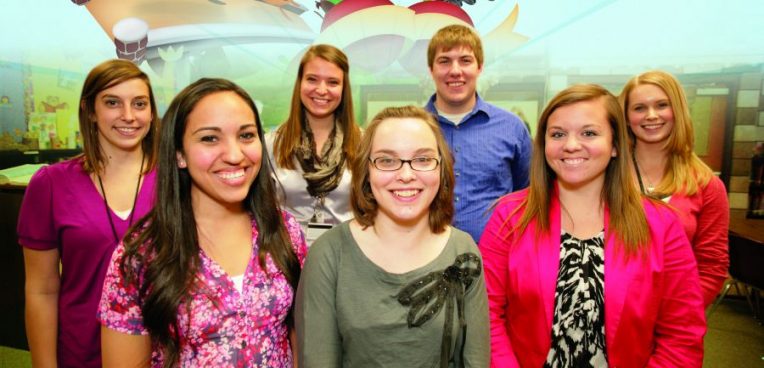Student teaching is integral to the preparation of teacher candidates, but it’s no secret that it can be an overwhelming experience. To help prepare special education majors for student teaching, a semester-long, field-based program was created. All learning behavior specialist (LBS1) teacher candidates complete this classroom experience prior to student teaching. Teacher candidates of special education in the deaf and hard of hearing and low vision and blindness programs also receive similar field-based experiences.
“I felt extremely confident going into student teaching,” said Michelle O’Rourke ’12, who completed her field-based placement in the Macon-Piatt Special Education District. “The field-based program gave me great confidence and assurance in myself as a professional.”
“The transition into student teaching came easily because I knew what was expected and what I needed to do in order to be successful in the classroom,” said Jennifer Joyce ’12, who completed her field-based experiences in Schaumburg.
“This placement gets their feet wet,” said Susie Niesman, a cooperating teacher in Macon-Piatt. “It is a chance for them to be involved in student learning early on, to receive immediate feedback from school faculty, and to be comfortable in their role because they are not responsible for everything quite yet.”
Macon-Piatt Special Education District is one of the four placement locations across Illinois where LBS1 majors can complete their field-based experience. All but one area (Chicagoland) offer students two, eight-week placements in different schools within their district. Macon-Piatt Special Education District is unique in that students often have an eight-week placement in a rural area of the district, followed by an eight-week urban school experience in Decatur.
“I have seen different teaching styles, diverse school programs, and new ways to think about teaching,” said Joyce. “By having this range of experiences, I can pull different aspects of each placement into my future classroom. By being part of so many different schools, I know what aspects of special education I will be seeking out in my first year of teaching.”
“Exposing LBS1 students to multiple classroom settings is critical to their future success,” said Kelli Appel, who facilitates the field-based program in her role as undergraduate program coordinator for the Department of Special Education.
“We are consistently told by alumni that the field-based experience was one of the most important parts of their teacher preparation,” said Appel.
“LBS1 licensure enables our graduates to teach K-12 and all disability areas, so they need extensive field-based experiences to gain expertise with students of various ages and a range of needs.”
During their placement, students are assigned projects designed to help them evaluate and improve their teaching and assessments.
“Each project that we were assigned for coursework related directly to the classroom,” said O’Rourke. “Once the projects were explained, I worked with my cooperating teacher and supervisor to see which project would be best suited for my particular classroom.”
An important piece of the coursework is working with cooperating teachers to implement each student’s Individualized Education Plan (IEP).
“Instruction for students with disabilities is very individualized, so it is crucial that students have the opportunity to practice that individualization,”said Appel.
“While the academic piece is important, I help them to understand that, especially in special education, there is a close relationship with the student, the social worker, and the family,” said Niesman. “You need to learn how that student learns best. The curriculum often falls in line once you have that relationship, that rapport.”
Relationship building is critical for the teacher candidates and their students, and the field-based program has proven to be one the strongest components of teacher preparation for the LBS1 program. Appel finds that feedback from alumni, cooperating teachers, and partnership sites is overwhelmingly positive and that hiring administrators have also taken notice.
“Administrators tell us that they prioritize hiring our graduates, and that because of their extensive field experience, they are much more ready to take off in their new position,” said Appel.
Field-based placements for learning behavior specialist (LBS1)
- McLean County field-based program: Unit 5, District 87, and Hammitt schools
- Chicago field-based program: Chicago Public Schools and multiple suburban districts
- Peoria field-based program: District 150
- Macon-Piatt counties field-based program: Macon-Piatt Special Education District, including Decatur and rural areas

